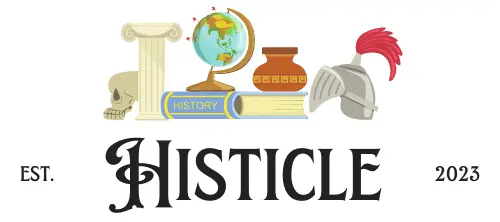
In this post, we’re diving into the long line of kings of France.
This table will guide you through each ruler, specifying their years on the throne and the royal house they came from.
While France has seen its share of powerful queens, our focus today is solely on the kings.
This list emphasizes the monarchs who have played pivotal roles in shaping the history of France, underlining the fact that, although there were queens, none held the ruling power as kings did.
Kings of France List (843 – 1848)

For another prominent list of European royals throughout the ages check out my list of the Kings and Queens of England and Great Britain!

FAQs: Kings of France from 843 to 1848
Louis XIV, known as the “Sun King,” is often considered the most powerful king in French history.
Reigning from 1643 to 1715, he is famous for his absolute monarchy and the phrase “L’état, c’est moi” (“I am the state”).
Louis XIV’s reign is marked by significant achievements, including the construction of the Palace of Versailles, which became the symbol of his absolute power and the center of French political, cultural, and artistic life.
He implemented major economic, political, and military reforms that strengthened the central government and positioned France as a dominant power in Europe.
His era saw the expansion of French territories through warfare and diplomacy, and his patronage of the arts led to a golden age of culture in France.
Louis XIV’s legacy is a complex one, intertwining immense power, cultural richness, and the burdens of war and personal absolutism.
The end of monarchy and the absence of a king in France can be attributed to several pivotal events and underlying factors, culminating in the French Revolution (1789-1799).
The revolution was driven by a combination of economic hardship, social inequality, and political discontent with the absolute monarchy, which was exemplified by the reign of Louis XVI.
The financial crisis, partly due to France’s involvement in costly wars (including support for the American Revolution), exacerbated the already widespread poverty and tax burdens on the common people, while the nobility and clergy enjoyed privileges.
The Estates-General was convened in 1789 to address the financial crisis, leading to the formation of the National Assembly by the Third Estate, which represented the common people.
This act set in motion a series of events that included the storming of the Bastille and the eventual overthrow of the monarchy.
The monarchy was officially abolished on September 21, 1792, and France was declared a republic. Louis XVI was executed in January 1793, signaling the definitive end of the French monarchy.
The subsequent rise of Napoleon Bonaparte and the establishment of the French Empire further ensured that the monarchy wouldn’t be restored until the Bourbon Restoration in 1814, which was then followed by another brief abolition during the Hundred Days of Napoleon’s return in 1815.
Although the monarchy was briefly restored again after Napoleon’s defeat, it ultimately ended with the July Revolution of 1830.
A constitutional monarchy lasted until the February Revolution of 1848, after which the Second Republic was established, leading to the eventual establishment of the French Republic in its current form.
Louis XIV of France (reigned 1643–1715) is often cited for his autocratic style of rule, which some have considered tyrannical.
However, a more fitting example of tyranny in the eyes of many historians and the public would be Louis XVI’s predecessor, Louis XV (reigned 1715–1774), or even Louis XVI himself (reigned 1774–1792), due to their roles in leading France into severe political and financial crises.
Louis XV is criticized for his lavish spending and perceived indifference towards the welfare of his subjects, which significantly contributed to the financial instability that plagued Louis XVI’s reign.
This financial mismanagement, coupled with widespread hunger and discontent, set the stage for the French Revolution.
Louis XVI, while not typically described as tyrannical in his personal demeanor, faced immense criticism for his inability to resolve France’s dire economic problems and for his initial resistance to reform.
His decisions during the French Revolution, including attempts to flee France and conspire with foreign monarchies, led many to view him as a tyrant who betrayed the nation, culminating in his execution in 1793.
Thus, while neither may be universally labeled as tyrants in the manner of despots from other eras or regions, their actions—or inactions—contributed to the perception of tyrannical misrule in the eyes of their contemporaries and subsequent generations.
References:
“BBC – History – King Louis XV.” Www.bbc.co.uk, www.bbc.co.uk/history/historic_figures/louis_xv.shtml.
Bouchard, Constance B. “The Bosonids or Rising to Power in the Late Carolingian Age.” French Historical Studies, vol. 15, no. 3, 1988, p. 407, https://doi.org/10.2307/286367. Accessed 2 May 2020.
Brown University Library Center for Digital Scholarship. “Paris: Capital of the 19th Century.” Library.brown.edu, library.brown.edu/cds/paris/chronology1.html.
“Capetian Dynasty | French History.” Encyclopædia Britannica, 2019, www.britannica.com/topic/Capetian-dynasty.
Chateau de Versailles. “Summoning of the Estates General, 1789.” Palace of Versailles, 22 Nov. 2016, en.chateauversailles.fr/discover/history/key-dates/summoning-estates-general-1789.
Ciara.Berry. “Henry vi (R.1422-1461 and 1470-1471).” The Royal Family, 14 Jan. 2016, www.royal.uk/henry-vi.
“Discover.” Palace of Versailles, 31 Aug. 2016, en.chateauversailles.fr/discover.
Élysée. “The Declaration of the Rights of Man and of the Citizen.” Elysee.fr, 14 Dec. 2022, www.elysee.fr/en/french-presidency/the-declaration-of-the-rights-of-man-and-of-the-citizen.
“France – Major Rulers of France.” Encyclopedia Britannica, www.britannica.com/place/France/Major-rulers-of-France.
“France – the Monarchy | Britannica.” Encyclopædia Britannica, 2019, www.britannica.com/place/France/The-monarchy.
Griffith, Michael. “Carolingian Dynasty.” World History Encyclopedia, 19 May 2021, www.worldhistory.org/Carolingian_Dynasty/.
“House of Orléans | Royal Family, Bourbon Dynasty, French Monarchy | Britannica.” Www.britannica.com, www.britannica.com/topic/house-of-Orleans. Accessed 5 Mar. 2024.
“List of All the Rulers of France, from 840 until 2017.” ThoughtCo, 2017, www.thoughtco.com/rulers-of-france-840-until-2015-3861418.
“Louis XIV.” Palace of Versailles, 27 Oct. 2016, en.chateauversailles.fr/discover/history/great-characters/louis-xiv.
“Robertian Dynasty.” Www.wikitree.com, www.wikitree.com/wiki/Space:Robertian_Dynasty. Accessed 5 Mar. 2024.
Royal Museums Greenwich. “French Revolution.” Www.rmg.co.uk, Royal Museums Greenwich, 2020, www.rmg.co.uk/stories/topics/french-revolution.
Royde-Smith, John Graham. “House of Bourbon | Definition, History, Dynasty, Members, & Facts | Britannica.” Encyclopædia Britannica, 2019, www.britannica.com/topic/house-of-Bourbon.
“The Bourbon Restoration | History Today.” Www.historytoday.com, www.historytoday.com/archive/bourbon-restoration.
“The French Monarchy.” Oxford Bibliographies, www.oxfordbibliographies.com/display/document/obo-9780195396584/obo-9780195396584-0258.xml. Accessed 5 Mar. 2024.
“The Home of Kings, the House of Ages.” Château de Fontainebleau, www.chateaudefontainebleau.fr/en/castle-fontainebleau-journey/the-residence-of-kings/. Accessed 5 Mar. 2024.
“Valois Dynasty | French Dynasty | Britannica.” Www.britannica.com, www.britannica.com/topic/Valois-dynasty.
